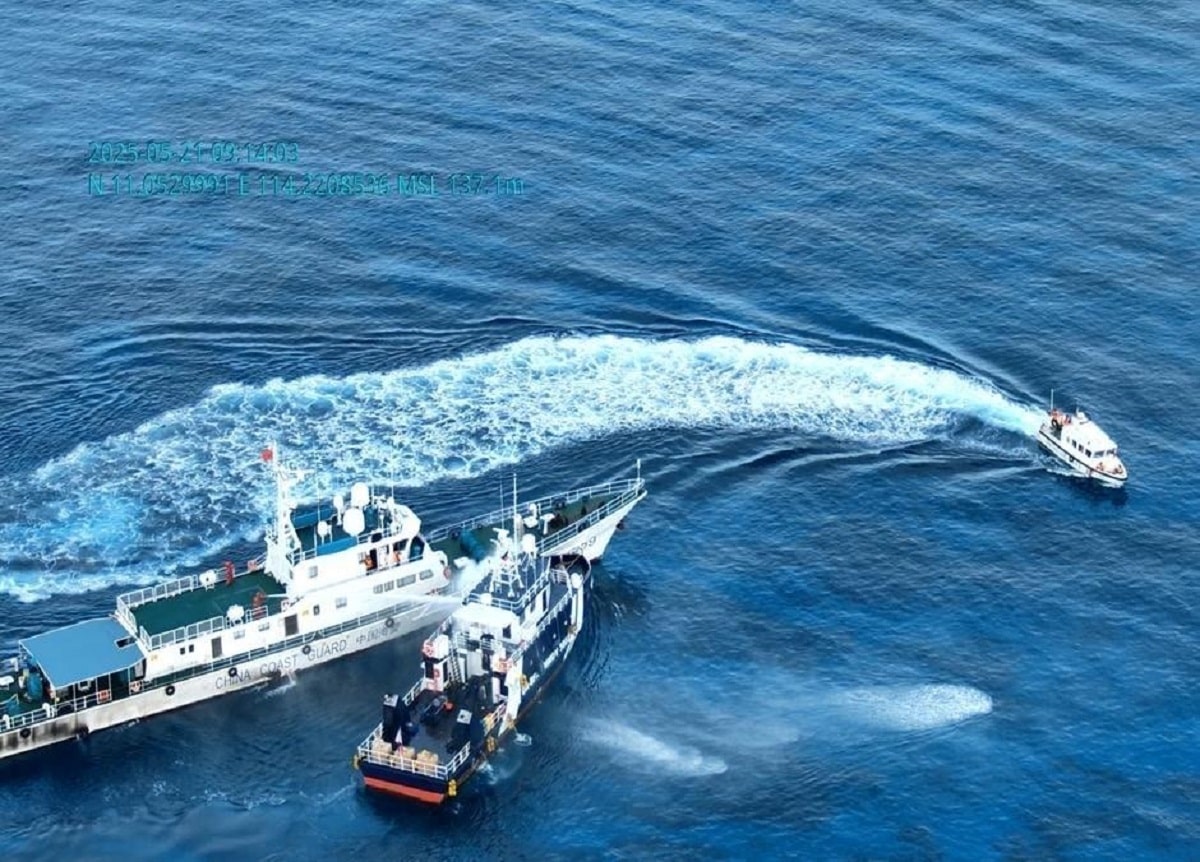Philippines, Lithuania sign defense pact amid West PH Sea challenges

LATEST BULLYING A China Coast Guard ship (left) cuts into the path of the BRP Datu Sanday of the Bureau of Fisheries and Aquatic Resources on Wednesday morning in the waters near Pag-asa Island in the West Philippine Sea. A smaller Chinese vessel (right) also makes a harassing maneuver. —PHOTO FROM THE PHILIPPINE COAST GUARD
MANILA, Philippines — The Philippines and Lithuania signed a defense cooperation agreement Monday in what Defense Secretary Gilberto Teodoro Jr. said is part of the Marcos administration’s alliance-building efforts,this time with the country which vocally supports the international arbitral award that heavily ruled in favor of Manila in its West Philippine Sea dispute with China.
Teodoro and his Lithuanian counterpart, Dovilė Šakalienė, signed the memorandum of understanding (MOU), which provides for a regional response algorithm for undersea infrastructure threats, bilateral consultations on cybersecurity, possibility of exchange of classified information, among other areas of cooperation.
Common threat
Both Teodoro and Šakalienė stated that the MOU was made as both countries face common challenges from their respective neighboring regional powers.
READ: DFA: Lithuanian foreign minister visits PH to promote bilateral ties
“There is also one common threat that underlies our partnership, in that we really need to resist and to insist on the proper application of international law, Unclos, and other international norms,” Teodoro said before the MOU signing, adding that such a pact is “part of the alliance-building efforts of the Marcos administration.”
Šakalienė noted that both Russia and China have applied “very similar approaches” in operating in the waters of Lithuania and the Philippines, respectively.
Šakalienė said: “We are looking forward to continuing these activities, and in addition, we see great potential for cooperation with the Philippines in many areas, such as maritime security, including challenges related to shadow fleets by some big countries, our neighbors operating in the South China Sea and the Baltic Sea.”
READ: Lithuanian president re-elected in vote marked by Russia fears
Security expert Chester Cabalza said such alliances between both nations are expected since Manila can identify with Vilnius’ “maritime insecurity” in the Baltic Sea.
“The common and comparative experiences of Vilnius in the Baltic Sea and Manila in the West Philippine Sea are lessons learned that there should be no monopoly in our maritime domains,” Cabalza, president and founder of Manila-based think tank International Development and Security Cooperation, said in an interview with INQUIRER.net on Monday.
During their joint press conference, Teodoro also said both countries are resisting the notion that “we are mere agents of other large powers when our people are in the front of standing up for our own national interests and our own futures.”
Pact to match ‘authoritarian’ unity
Lithuania joined as an observer in the last war games of Manila and Washington. Manila had also joined Vilnius’ largest cyber drills recently.
According to Šakalienė, such cooperation with like-minded nations is crucial, as countries like China and Russia, which she called “authoritarian,” are now in close cooperation.
“What we see now is, authoritarian states are really cooperating efficiently, supporting each other politically, financially, militarily,” Šakalienė said, adding that this is evident with the current war in Ukraine.
“If they work together to threaten us, then we must work together to defend ourselves, and to send a very clear strategic message. We are not going to let ourselves be scared. We are not going to let them enter our territory. We are not going to let them change the current world order based on international rules. We are going to stand up to them together,” she continued.
Šakalienė said that the European Union, the United States, and the Indo-Pacific countries are now forming a “triangle of resistance and resilience” against such threats.
The Chinese acts against Filipino fishermen did not escape the attention of Šakalienė, who wears her sanction from Beijing as a “badge of honor.”
“It is horrifying, the materials, video, how they are threatening Filipino fishermen, how they are treating people who are simply making their living in their own waters and their own territory,” she said.
Beijing has continuously made aggressive actions against the Filipino navy and fisherfolk in its bid to establish its sovereignty claim in almost the entire South China Sea, but the arbitral award effectively dismissed this while ruling heavily in favor of Manila’s sovereign rights in the West Philippine Sea.
Lithuania, a member of the European Union, has repeatedly affirmed its support for the 2016 arbitral award./dl/coa
For comprehensive coverage, in-depth analysis, visit our special page for West Philippine Sea updates. Stay informed with articles, videos, and expert opinions.


















